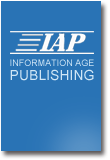
Developing an Intersectional-Consciousness and Praxis in Antiracist Efforts
Edited by:
Jonathan A. McElderry, Wake Forest University
Stephanie Hernandez Rivera, Kean University
A volume in the series: Identity & Practice in Higher Education-Student Affairs. Editor(s): Pietro A. Sasso, Delaware State University. Shelley Price-Williams, University of Northern Iowa.
Developing an Intersectional-Consciousness and Praxis in Antiracist Efforts, edited by Jonathan A. McElderry and Stephanie Hernandez Rivera, is meant to support practitioners in understanding the impacts of the mental, emotional and physical well-being of students who experience intersectional-marginalization in institutions of higher education, with a particular focus on how racism intersects with other forms of oppression. Contributors within this edited text will explore multiple dimensions of the institution to highlight the varying ways students experience intersectional-marginalization, as well as how we work to address it.
BOOK DESCRIPTION:
This text highlights how students who experience intersectional-marginalization are often invisible in institutional attempts to address inequitable and exclusive campus culture and environments. As institutions continue to grapple with and consider addressing students who are marginalized by institutional culture, it becomes imperative to address inequities in ways that are more comprehensive.
TEXT OVERVIEW:
The edited text will be organized using the ACPA/NASPA Professional Competency Areas for Student Affairs Educators as a guideline. Each chapter will also conclude with a self-reflective assessment and critical-reflection questions.
• Student Affairs: This section includes research and conceptual works that explore how areas in student affairs challenge intersectional-marginalization for students who access and experience the varied dimensions of student affairs. Context of the study can include but is not limited to: residential life, campus dining, fraternity and sorority life, campus activities, student life, and so forth.
• Equity and Inclusion Efforts: This section explores and analyzes current equity and inclusion efforts and how they potentially stifle the identity development of marginalized students or address marginalized students of color needs through a “single-axis of analysis.” Research and conceptual works from and within identity centers, diversity, equity and inclusion divisions, cultural and self-preservation organizations and groups, equity and inclusion initiatives, and so forth will be considered.
• Health and Wellness: This section should speak to and address the mental, emotional, physical, and/or spiritual needs of students with more than one marginalized identity and its impact. This can be work in student health, counseling services, behavioral health, health and wellness initiatives, or research that examines well-being for students.
• Teaching and Advising: This area should explore pedagogical and advising practice that supports intersectionality-marginalized student experience.
• Institutional Leaders: This section can speak to the leadership of institutional leaders, missed opportunities, expanding beyond a single-identity approach to addressing campus inequity, and why intersectional praxis is imperative in transforming inequitable and exclusive institutional practice, policy, and culture.
CHAPTER SUBMISSION GUIDELINES:
Chapters should address one of the topics listed in the text overview. Individual chapters must be no longer than 10-12 pages to a maximum of 15 pages (including references), limited to a maximum of three figures/tables/charts and formatted to APA 7th Edition. Prospective authors should submit an abstract of no more than 500 words, and a bio of all the chapter author(s), by March 15, 2022 to the editors: Jonathan A. McElderry, jon.mcelderry@gmail.com and Stephanie Hernandez Rivera, stephaniemarie5887@gmail.com using this submission form.
TENTATIVE SCHEDULE FOR PUBLICATION:
Call for Authors (due by March 30, 2022): February 1, 2022
Selection of Authors: April 15, 2022
Submission of book chapter due to Editors: August 1, 2022
Edited Feedback to Authors: November 1, 2022
Revised Drafts due to Editors: February 1, 2023
Final book submitted to publisher: May 1, 2023
Send all inquiries to: Jonathan A. McElderry, at jon.mcelderry@gmail.com and/or Stephanie Hernandez Rivera, at stephaniemarie5887@gmail.com
- This title is in development and is not yet available to order online. Please call the IAP office for more information: 704.752.9125

-
 Affirming Identity, Advancing Belonging, and Amplifying Voice in Sororities and Fraternities
Affirming Identity, Advancing Belonging, and Amplifying Voice in Sororities and Fraternities
-
 Identity in Supervision
Understanding Who Works for You and Who You Work for in Higher Education
Identity in Supervision
Understanding Who Works for You and Who You Work for in Higher Education
-
 Institutional Diversity in American Postsecondary Education
Institutional Diversity in American Postsecondary Education
-
 Latinx College Students
Innovations in Mental Health, Advocacy, and Social Justice Programs
Latinx College Students
Innovations in Mental Health, Advocacy, and Social Justice Programs
-
 Still Working While Black
The Untold Stories of Student Affairs Practitioners
Still Working While Black
The Untold Stories of Student Affairs Practitioners
-
 Stir What You’ve Got
Insights From a College President
Stir What You’ve Got
Insights From a College President
-
 Working While Black
The Untold Stories of Student Affairs Practitioners
Working While Black
The Untold Stories of Student Affairs Practitioners
